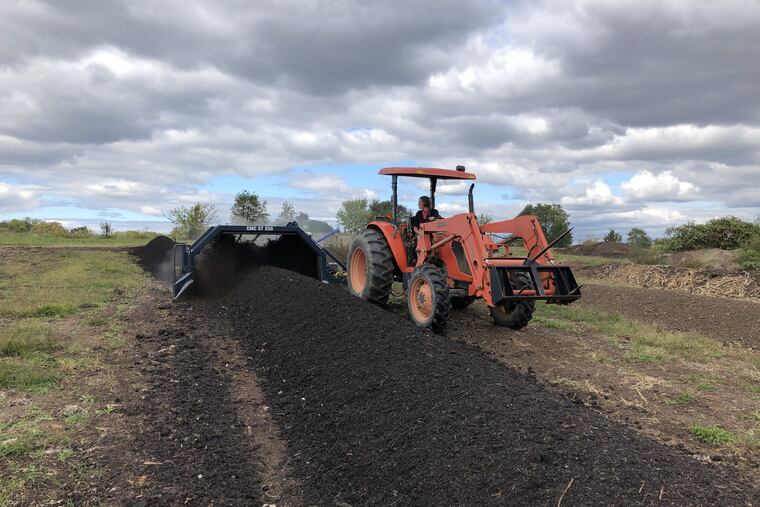Pa. college plans to power two farms from cafeteria waste, cow manure, and brewery scraps
Dickinson College plans to harness enough energy from its 1,000 pounds a day of food waste to power its two farms — and sell excess back to the local utility.

The Dickinson College dining hall serves up a varied menu ranging from Monte Cristo casserole and cranberry chicken to, of course, pizza.
But the 1,000 pounds a day of food waste produced by the Carlisle, Pa., campus is a hidden energy source that school officials say they plan to tap into.
That waste, along with local cow manure, scraps from local schools, and grain from local brewers, can create enough energy to power operations at the school’s 80-acre, USDA-certified organic farm, and an adjoining dairy farm it leases, said Matt Steiman, energy projects manager at Dickinson’s farm.
Not only that, but Steiman said there will likely be surplus energy to sell back to Met-Ed, the local utility company.
» READ MORE: These Pa. colleges are going all in on renewable energy — with a little help from a Texas solar farm
Currently, most of the school’s food waste gets composted. By next year, plans call for it to go into a 14-foot-high, 75,000-gallon stainless steel biodigester where bacteria will break it down, producing a gas that runs a generator to produce electricity. The power will go into the local grid.
The plan is made possible by a $300,000 grant from the U.S. Environmental Protection Agency toward the college’s purchase of the tank and equipment. The grant is part of the EPA’s program to reduce what it says is 38 million tons of food waste sent to landfills and incinerators each year in the United States.
The total project cost is about $1 million, and the balance will be paid from a USDA grant and money from the school.
“For the college farm, this is really a game changer,” Steiman said. “That will make us net energy producers.”
Steiman said the biodigester should produce up to 300,000 kilowatt hours of electricity a year, or enough to power 25 homes.
» READ MORE: South Jersey Superfund site transformed into solar field capable of powering up to 2,600 homes
However, in this case, it would power the school’s farm, where students grow and sell vegetables and beef, as well as the dairy farm, both in Boiling Springs, about six miles from the main campus. Dickinson also owns an adjoining farm that it leases to a dairy farmer.
The school’s farm has been experimenting with a 2,000-gallon biodigester program since 2015. The new biodigester will expand the program into a commercial-scale operation. It will be placed on the dairy farm.
Cow manure from the dairy farm will go into the energy mix. Using manure in that way keeps it off the fields, where it can pollute a local trout stream.
“We’ll use cow manure, cow urine, ground cafeteria waste from Dickinson College and the Carlisle School District, and spent brewers' grain, from three different breweries in Carlisle, as well as milk processing byproducts from Land O’Lakes, which is just two miles down the road,” Steiman said. “You’ll see cupcakes, ground-up hot dogs, rice, and just about everything in the biodigester.”
Steiman hopes the biodigester, made by Bioelectric, a Belgium-based company, will be producing electricity by fall 2021. For the purchase and installation, Dickinson is working with Martin Energy Group Services, a national engineering and construction group that has a Pennsylvania office.
Steiman said contractors are lined up for the work and await the arrival of the biodigester and permitting from the state Department of Environmental Protection.
» READ MORE: Misfits Market, which distributes ‘ugly’ produce for cheap, raises $85 million and plans to double its work force
Kenneth Shultes, in charge of the school’s sustainability planning, said the biodigester project will reduce the school’s overall carbon emissions by 120 metric tons annually.
“This fits with the college’s mission, and everything that we’re doing with sustainability," Schultes said.